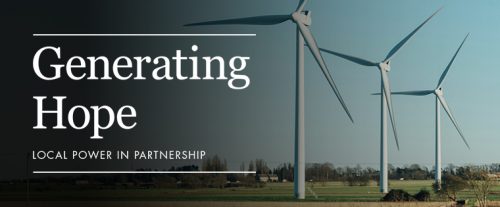Generating Hope
Local power in partnership
Author: Callin McLinden, Sandy Forsyth & Joe Fyans |

Elected on a platform with strong emphasis on energy security and decarbonisation, the UK Government has set a goal of ‘clean power’ by 2030 and established Great British Energy (GB Energy) to drive progress through investment in and development of clean energy projects. The Local Power Plan, a component of GB Energy, aims to support local and combined authorities, as well as community energy groups, through funding and assistance for small and medium-scale renewable energy projects. With detail on the Local Power Plan as yet unsubstantiated, Generating Hope looks at how the plan can best build on best practice and overcome local barriers to drive decarbonisation of energy at the level of place.
Local authorities play an essential role in achieving net zero, as a significant portion of UK carbon emissions fall within their scope of action. However, the approach from central government in recent years has been inconsistent, with support for councils to deliver on this agenda often underfunded and piecemeal. While the level of government funding is at the heart of the problem at local level, the issues caused play out in a variety of ways, requiring a nuanced and multifaceted policy solution. Multiple technical, financial and political barriers hinder the further deployment of renewable energy. The solutions to these problems must emphasise the potential for renewable energy to address socio-economic challenges related to the energy trilemma of sustainability, security and affordability.
Key points
Public-private partnership
Strategic, long-term energy partnerships are being developed by councils and partners as a transformative approach to decentralising and decarbonising the UK’s energy system, empowering communities, reinvesting profits locally, and addressing socio-economic disparities. Strategic local energy partnerships bypass traditional barriers to innovation by fostering direct collaboration among local energy stakeholders. This helps to circumvent fragmented decision-making structures and lengthy tender processes, enabling agile and resilient responses to local energy challenges. The success of these partnerships hinge on their alignment with, and flexibility around, evolving policy at local and national level.
The importance of planning
The government is committed to planning reform, aimed at unblocking supply and delivering 1.5 million homes. To achieve this goal, development must align with local stakeholder discretion and community needs, ensuring projects support local requirements – new, large-scale development offers an opportunity to inject environmental sustainability and energy efficiency into local areas and bring socio-economic benefits to communities. Effective energy planning, embedded in the broader framework of Local and Neighbourhood Plans, is essential for integrating these considerations into broader local strategies and ensuring sustainable development.
Trust and engagement
Public opposition, or even the perception of it, can hinder renewable energy deployment. Locally, this means that councils need to balance public engagement with resource availability and the necessity for renewable energy development. Quantifiable benefits, such as job creation, local economic multipliers, and overall reductions in carbon emissions, must be documented and published to maintain public trust. At the local level, communities need material evidence that projects are delivering rather than merely serving as symbolic gestures. At central government level, it is crucial that the capital costs of achieving net zero do not become obstacles to public support. Alleviating the upfront burden of renewable capital infrastructure from energy bills is therefore both an economic and political imperative, especially with the ongoing cost of living crisis.
Recommendations
The establishment of GB Energy and the promise of a Local Power Plan have the potential to transform central-local relations in the energy transition. The recommendations below, drawn from the research carried out for this project, present some considerations for the key actors involved in the production and implementation of the Local Power Plan.
Enabling the Local Power Plan
Enabling the local power plan will require concerted action across departments, integrating the ambitions of GB Energy with the planning system changes from MHCLG, the overall net zero ‘mission control’ of DESNZ and the strategic spatial energy plan of the National Energy System Operator. Action must also accord with English devolution policy and facilitate the upskilling of actors at local authority and community level. To create the conditions for success at local level, central government should:
- Produce legislation to formalise local area energy planning, to ensure new development contributes to the energy transition whilst also gaining a clearer national picture of future grid demand.
- This could involve integrating LAEPs with the Local Plan process, or ensuring that completed and approved Local Plans have a statutory LAEP attachment.
- These plans should feed into future iterations of the National Energy System Operator’s strategic spatial energy plan.
- Frameworks for producing LAEPs should not be overly restrictive, allowing for local variation.
- Consolidate funding streams for clean energy projects in local areas.
- Build community capacity to engage with energy projects.
- This would involve working with the community and voluntary sector to build government-funded projects for training and development of community groups looking to get involved with decentralised energy.
- Establish regional energy data centres to help local authorities make evidence- led plans.
- This initiative could connect with the plans for subregional data analytics centres headed up by strategic authorities, as announced in the English Devolution White Paper.
- Streamline the application process for grid connection to help communities realise the benefits faster.
- Invest in local government skills programmes to allow councils to recruit, train and retain staff who can engage with the energy market.
Delivering the Local Power Plan
The delivery of a successful Local Power Plan will require concerted action across sectors and levels of government.
Central government should:
- Provide local authorities with support in procurement and contracting to access complex markets.
- This could involve utilising the Local Net Zero Hub network to extend government support for procurement officers and policy teams in developing tenders, specifications and contracts.
- Provide capacity support for planning applications, to accelerate the planning process for new local infrastructure.
- The technical detail of some energy infrastructure planning applications prevents timely resolution. A central government funded support hub could act as a mechanism to address this problem.
- Build on successful examples of strategic energy partnerships to produce a contracting framework for local authorities looking to procure long-term public-private partnerships.
Local government should:
- Provide robust data and measurement mechanisms for monitoring and evaluation.
- Target quantifiable benefits to local communities.
- Develop financial instruments such as Community Municipal Investments and Green Bonds to help support local communities.
- Embed Green Public Procurement in their procurement of energy services and utilities.
Private sector partners should:
- Practice meaningful community consultation over the direction of projects and funding.
- Prioritise local job creation in delivering projects.
- Work with a local supply chain to ensure the retention of economic benefits.
Making the Local Power Plan work
To ensure that the Local Power Plan is politically viable at place level, government should consider moving the capital burden of renewable infrastructure away from household bill levies. The government should also consider the reintroduction of feed- in tariffs to help enable participation.
This research project is kindly being sponsored by:

